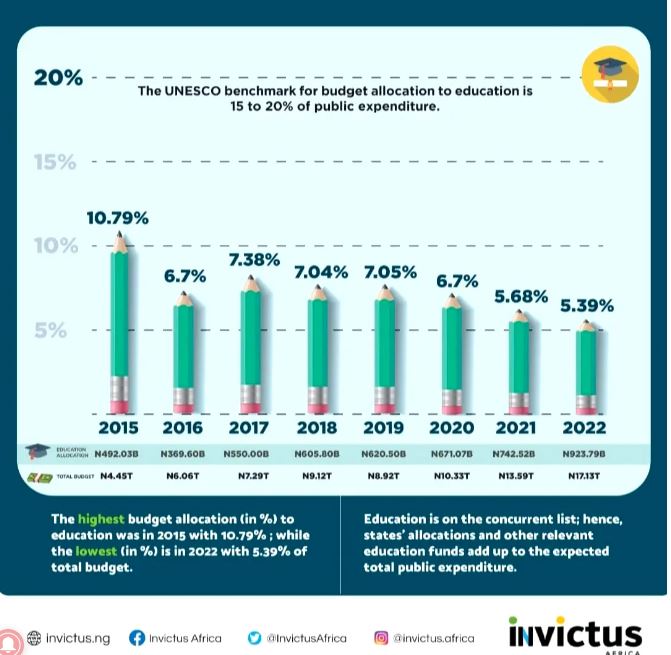Fed education budget at 5.39% triggers ASUU strike
By Jeph Ajobaju, Chief Copy Editor
Invictus Africa says Nigeria allocated the lowest budget to education this year, again underscoring the reason for agitation by the Academic Staff Union of Universities (ASUU) which has been on strike since February, forcing students onto the streets.
A report by the advocacy group entitled, “Data and Analysis of the Federal Government of Nigeria’s Budgetary Allocation to Education between 2015 and 2022”, highlights N923.79 billion education vote in 2022, the lowest in a decade.
“The Federal Government’s 2022 budgetary allocation to education is 5.39 per cent, which is N923.79 billion out of the total budget of N17.13 trillion. This is being expended on personnel (N662.7 billion), overheads (N38.8 billion), and capital expenditure (N222.2 billion),” Invictus Africa said.
“The 5.39 per cent allocation is not only a minuscule 0.29 per cent increase from the 2021 budget in which 5.68 per cent was allocated to the sector, it is the lowest per centage allocation to education by the Federal Government in the last ten years.
“Further considering that the 5.39 per cent is a 50 per cent reduction from the 10.79 per cent allocated to education in 2015, a comparative estimate of the Naira value of these percentages, when subjected to dollar exchange, shows only a slight difference between the 2015 allocation and that of 2022.
________________________________________________________________
Related articles:
TETFund rakes in N1.7tr from company profit tax
Nigerian unis lack space for 323,782 medical students
Tertiary schools to make N3.33b from post-UTME test
_________________________________________________________________
UNESCO benchmark
“Invictus Africa reiterates the United Nations Educational, Scientific and Cultural Organisation (UNESCO) benchmark of four to six per cent of Gross Domestic Product (GDP) or 15 to 20 per cent of public expenditure,” Invictus Africa added, via reporting by Vanguard.
“Considering that education is on the concurrent list in the Nigerian Constitution, to ascertain the percentage of total public expenditure on education in Nigeria, different sources of funds must be put into consideration, such as budget allocations by States and the Federal Government, and the Tertiary Education Trust Fund (TETFund), among others.
“This data, however, only shows the Federal Government’s allocation to education.”
Low education budget signals government priority
Invictus Africa Executive Director of Invictus Africa Bukky Shonibare lamented the negative impact of low allocation to education by the federal government.
“The need for better funding of FG-owned public universities is one of the many issues causing the seemingly endless strike actions by the Academic Staff Union of Universities, ASUU.
“The current ASUU strike has been on since February 14, 2022, halting tertiary education for many students,” she said.
In her view, budgetary allocations indicate government’s priorities and political will, and a rise in education budget would enable more schooling population access free, safe, and quality education, and increase uptake of secondary and tertiary education.
“Government’s investment in education is not only in fulfillment of its obligation to fulfill the right to education, it is strategic, as investing in education is directly linked to, among others, reduction in poverty and crimes, as well as improvements in Nigeria’s economic potential and capacity.”













